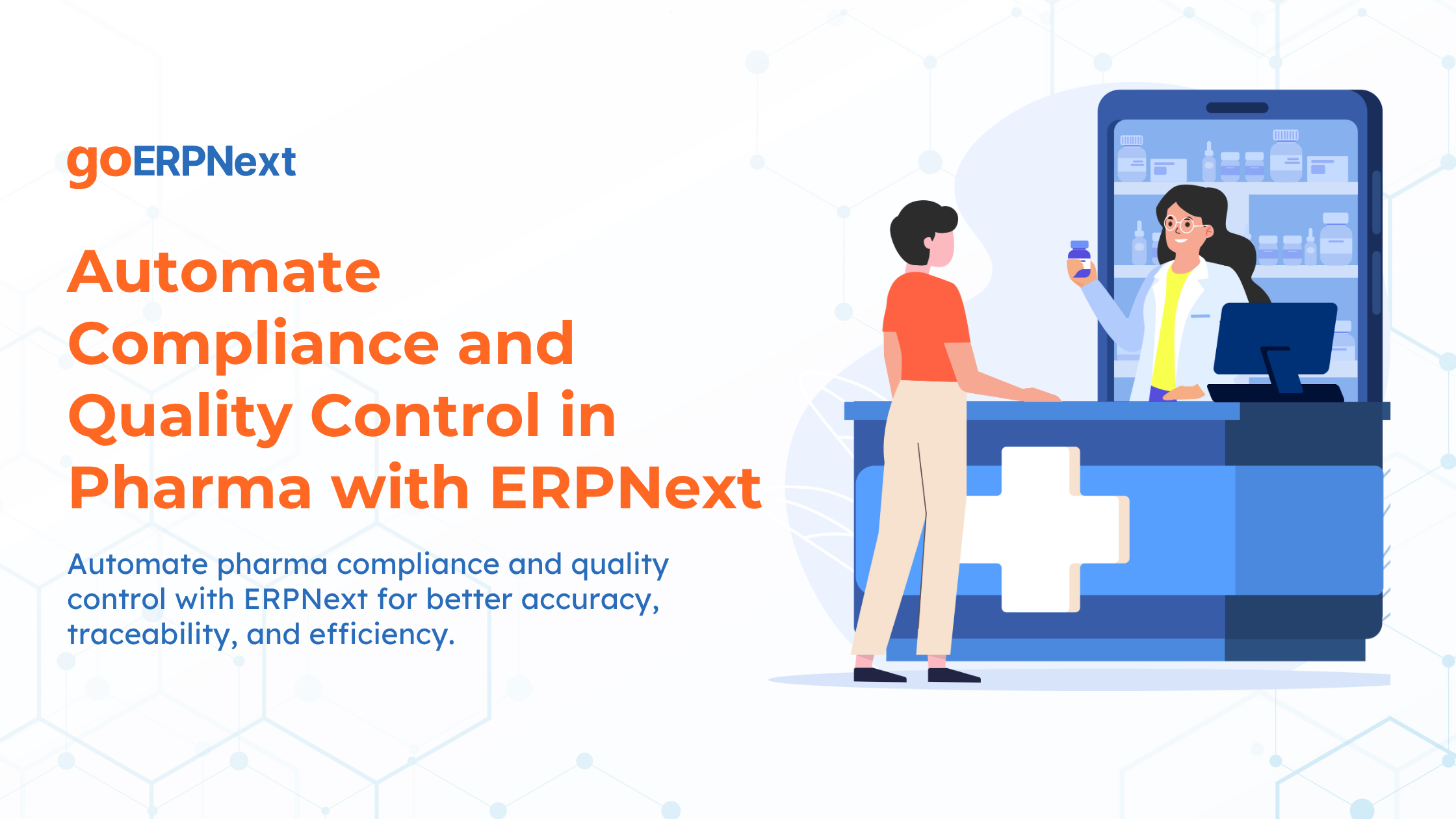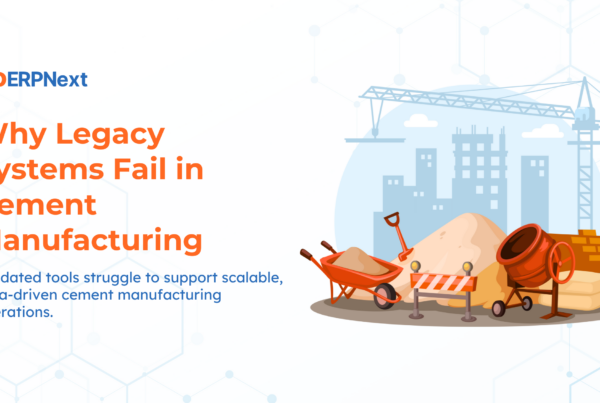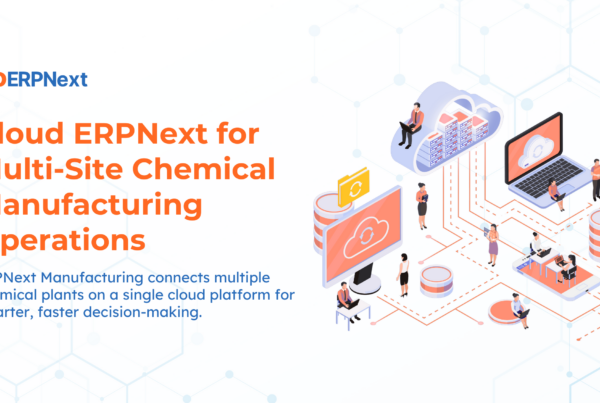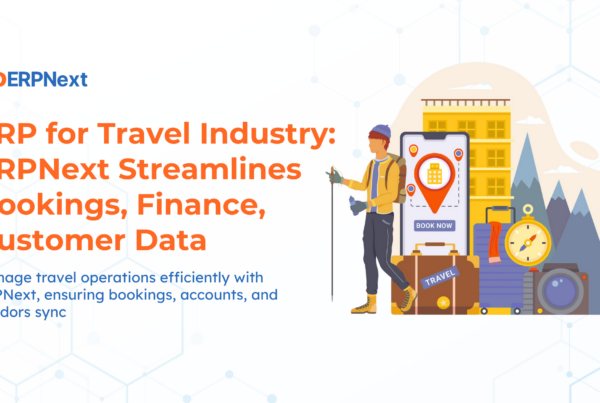
Introduction
In the pharmaceutical industry, where precision, compliance, and quality are paramount, manual processes often fall short of meeting rigorous standards. The margin for error is slim, and regulatory bodies like the FDA, WHO, and EMA demand strict adherence to quality protocols and documentation. As a result, pharmaceutical companies are increasingly turning to digital solutions like ERPNext to automate compliance and streamline quality control processes.
ERPNext, an open-source and highly customizable ERP software, is rapidly becoming a go-to solution for pharmaceutical manufacturers aiming to ensure regulatory compliance, batch traceability, audit readiness, and consistent product quality — all from a centralized platform.
Why Compliance Matters in Pharma
Pharmaceutical companies operate in one of the most tightly regulated industries in the world. Failing to comply with global or regional standards can lead to:
- Product recalls
- Heavy fines
- Loss of reputation
- Legal consequences
- Revoked licenses or shutdowns
Regulatory bodies require comprehensive documentation for every process — from raw material sourcing to product distribution. Ensuring compliance manually across all departments is not only inefficient but also prone to human error. That’s where ERPNext comes in.
ERPNext: A Catalyst for Compliance and Quality Automation
ERPNext offers a suite of features specifically designed for industries like pharmaceuticals. It helps automate tasks, standardize operations, and ensure compliance across every function.
Key Benefits:
Regulatory Compliance Automation
ERPNext supports frameworks like GMP (Good Manufacturing Practice), GAMP (Good Automated Manufacturing Practice), and ISO standards. Through customizable workflows, validation checkpoints, and digital signatures, the system ensures that processes comply with the required regulatory norms.
Centralized Documentation & Audit Trail
Every transaction, batch record, quality check, or approval can be automatically logged, timestamped, and associated with specific users. This provides a clean, traceable audit trail necessary for regulatory audits.
Electronic Batch Records (EBR)
ERPNext facilitates automated batch documentation, making it easier to trace ingredients, monitor production, and validate consistency from batch to batch — a must for quality control and FDA inspections.
Automating Quality Control in Pharma with ERPNext
In pharma, quality isn’t just a checkbox — it’s integral to product safety and efficacy. ERPNext’s integrated Quality module plays a critical role in enforcing this.
1. Incoming Material Inspection
Automated quality checks at the point of material receipt help identify and reject substandard raw materials. You can define specific inspection criteria for each item and automate pass/fail logic based on test results.
2. In-Process Quality Checks
During manufacturing, ERPNext enables checkpoints at critical stages — ensuring that every stage adheres to the standard operating procedures (SOPs). Any deviation can trigger alerts or halt production.
3. Finished Goods Inspection
Before products move to distribution, ERPNext facilitates stringent quality testing against predefined benchmarks. Certificates of Analysis (CoA) can be generated automatically, making compliance faster and more accurate.
4. Non-Conformance and Corrective Actions (CAPA)
If a product or process fails a quality check, ERPNext allows easy logging of non-conformance reports, root cause analysis, and initiation of corrective/preventive actions. Each step can be tracked and documented for future audits.
Role-Based Access and User Controls
In regulated environments, controlling who can access or modify data is critical. ERPNext provides:
Role-based access control
- User activity logs
- Approval hierarchies
- Digital signatures
This ensures data integrity and prevents unauthorized changes to sensitive records, a vital requirement for data compliance under 21 CFR Part 11 (FDA).
Lot and Batch Traceability
ERPNext allows complete tracking of raw materials, intermediates, and final products via unique batch IDs and serial numbers. This ensures:
- Quick recall management
- End-to-end traceability
- Real-time tracking of stock movements
- Enhanced visibility in the supply chain
Traceability is vital not only for internal controls but also for satisfying global pharmaceutical compliance standards.
Automated Workflows and Alerts
Customizable workflows in ERPNext help automate approvals, documentation, and escalations. For example:
- Automatic approval routing for deviation reports
- Auto-generated email alerts for quality failures or audit due dates
- Real-time updates on stock nearing expiry
Automation significantly reduces manual bottlenecks and increases efficiency while ensuring compliance.
Integration with Laboratory Information Management Systems (LIMS)
ERPNext can be integrated with LIMS to consolidate lab testing, inventory usage, and results directly into the ERP. This eliminates data silos and ensures that quality testing data is seamlessly linked with production and inventory records.
Mobile and Cloud Accessibility
Pharmaceutical field officers, plant managers, or QA personnel can access ERPNext from any location via mobile or browser. This mobility:
- Enables real-time reporting
- Allows digital data capture at the point of origin
- Supports remote audits and virtual inspections
Cloud deployment also ensures better disaster recovery, data security, and lower infrastructure cost.
KPI Dashboards for Real-Time Monitoring
ERPNext allows you to set KPIs for quality and compliance, such as:
- Rejection rates
- CAPA resolution time
- Number of non-conformance reports (NCR)
- QC pass rates per product
These metrics can be monitored in real-time through interactive dashboards, aiding continuous improvement and proactive decision-making.
Cost Efficiency Through Automation
Beyond compliance, ERPNext helps reduce operational costs by:
- Minimizing paperwork and manual documentation
- Reducing human errors
- Optimizing inventory with real-time updates
- Preventing costly rework and recalls
- Avoiding compliance penalties
Real-World Example Use Cases
Raw Material Approval Workflow
- Configure rules to automatically block use of raw materials until they pass lab tests.
Environmental Monitoring
- Record room temperature, humidity, and pressure automatically through IoT integrations and sync data in ERPNext for compliance logs.
Audit Readiness
- With every document traceable, every batch report digitized, and every process validated, companies can be audit-ready with minimal preparation.
Conclusion
In an industry where compliance and quality are non-negotiable, ERPNext empowers pharmaceutical companies to shift from reactive control to proactive assurance. By automating documentation, approvals, traceability, and testing workflows, ERPNext enables faster operations, reduced errors, and absolute adherence to regulatory standards.
Whether you’re a small formulation lab or a large-scale pharma manufacturer, investing in an ERP system like ERPNext is not just about operational efficiency — it’s about building trust, meeting compliance, and ensuring patient safety at every step.


